2016新课标三维英语必修5U1S3
- 格式:doc
- 大小:171.50 KB
- 文档页数:10
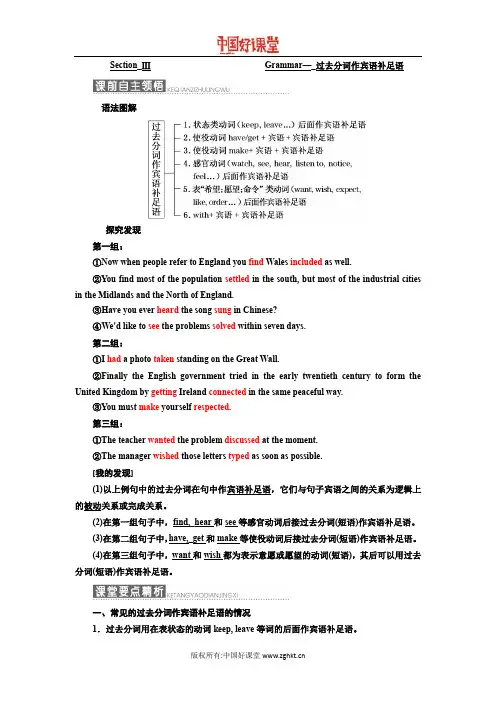
Section_ⅢGrammar—_过去分词作宾语补足语语法图解探究发现第一组:①Now when people refer to England you find Wales included as well.②You find most of the population settled in the south, but most of the industrial cities in the Midlands and the North of England.③Have you ever heard the song sung in Chinese?④We'd like to see the problems solved within seven days.第二组:①I had a photo taken standing on the Great Wall.②Finally the English government tried in the early twentieth century to form the United Kingdom by getting Ireland connected in the same peaceful way.③You must make yourself respected.第三组:①The teacher wanted the problem discussed at the moment.②The manager wished those letters typed as soon as possible.[我的发现](1)以上例句中的过去分词在句中作宾语补足语,它们与句子宾语之间的关系为逻辑上的被动关系或完成关系。
(2)在第一组句子中,find,_hear和see等感官动词后接过去分词(短语)作宾语补足语。
(3)在第二组句子中,have,_get和make等使役动词后接过去分词(短语)作宾语补足语。
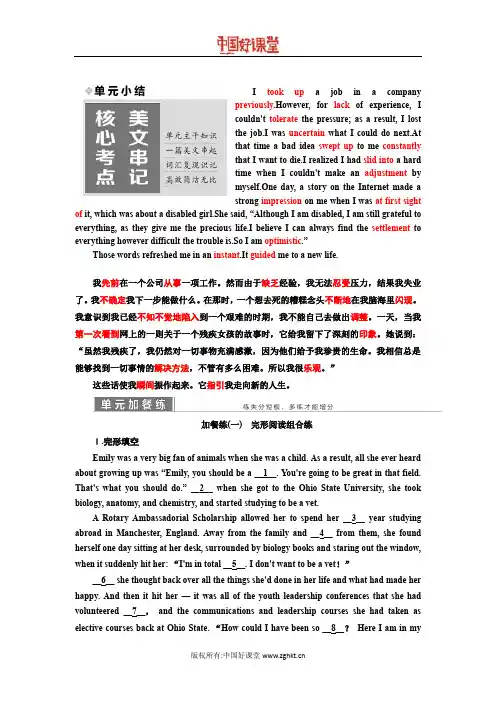
I took up a job in a companypreviously.However, for lack of experience, Icouldn't tolerate the pressure; as a result, I lostthe job.I was uncertain what I could do next.Atthat time a bad idea swept up to me constantlythat I want to die.I realized I had slid into a hardtime when I couldn't make an adjustment bymyself.One day, a story on the Internet made astrong impression on me when I was at first sight of it, which was about a disabled girl.She said, “Although I a m disabled, I am still grateful to everything, as they give me the precious life.I believe I can always find the settlement to everything however difficult the trouble is.So I am optimistic.”Those words refreshed me in an instant.It guided me to a new life.我先前在一个公司从事一项工作。
然而由于缺乏经验,我无法忍受压力,结果我失业了。
我不确定我下一步能做什么。
在那时,一个想去死的糟糕念头不断地在我脑海里闪现。
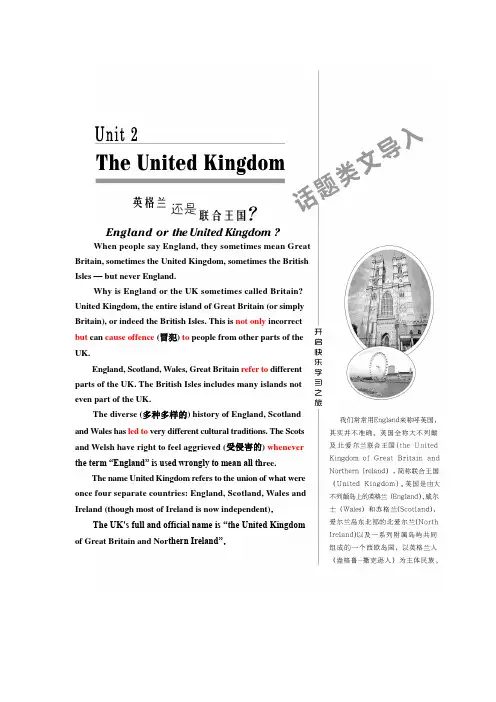
When people say England, they sometimes mean Great Britain, sometimes the United Kingdom, sometimes the British Isles — but never England.Why is England or the UK sometimes called Britain? United Kingdom, the entire island of Great Britain (or simply Britain), or indeed the British Isles. This is not only incorrect but can cause offence (冒犯) to people from other parts of the UK.England, Scotland, Wales, Great Britain refer to different parts of the UK. The British Isles includes many islands not even part of the UK.The diverse (多种多样的) history of England, Scotland and Wales has led to very different cultural traditions. The Scots and Welsh have right to feel aggrieved (受侵害的) whenever the term “England” is used wrongly to mean all th ree.The name United Kingdom refers to the union of what were once four separate countries: England, Scotland, Wales and Ireland (though most of Ireland is now independent).The UK's full and official name is “the United Kingdom of Great Britain and Nor thern Ireland”.SectionⅠWarming Up & Reading — Pre-reading[原文呈现]PUZZLES① IN GEOGRAPHYPeople may wonder why different words are used to describe these four countries: England, Wales②,Scotland③ and Northern Ireland④. You can clarify⑤ this question if you study British history.First there was England. Wales was linked to⑥ it in the thirteenth century. Now when people refer to⑦ England you find Wales included⑧ as well⑨. Next England and Wales were joined to⑩Scotland in the seventeenth century and later the name was changed to “Great Britain”. Happily this was accomplished⑪without conflict⑫when King James of Scotland became King of England and Wales as well. Finally the English government tried in the early twentieth century⑬to form the United Kingdom by getting Ireland connected in the same peaceful way⑭. However, the southern part of Ireland was unwilling⑮and broke away ⑯to form its own government. So only Northern Ireland joined with England, Wales and Scotland to become the United Kingdom⑰and this was shown to the world in a new flag called the Union Jack⑱.[读文清障]①puzzle n.谜;难题②Wales [weIlz]威尔士(英)③Scotland ['skɒtlənd]苏格兰(英)④Northern Ireland ['aIələnd]北爱尔兰(英)⑤clarify['klærIfaI]v t.澄清;阐明⑥link A to B把A与B连接、联合起来,此处为被动语态。
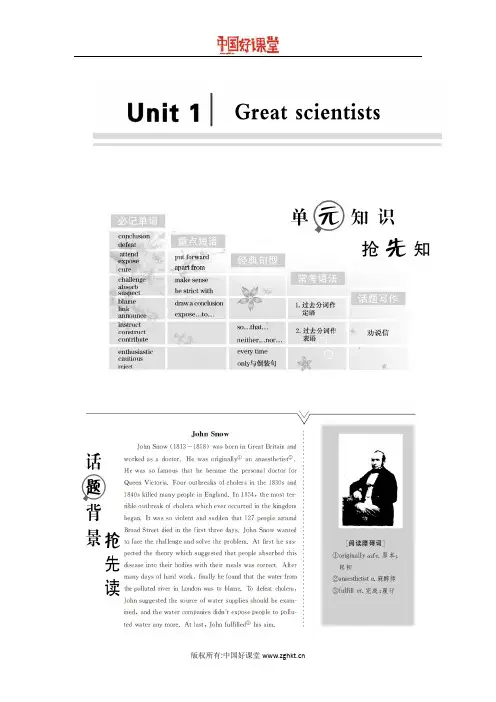
Ⅰ.Match the word with its meaning.1.conclude A.n.受害者2.defeat B.v t.&v i.结束;推断出3.attend C.v t.暴露;揭露;使曝光4.expose D.v t.打败;战胜;使受挫n.失败5.cure E.v t.照顾;护理;出席;参加6.challenge F.v t.吸收;吸引;使专心7.victim G.n.治愈;痊愈v t.治愈;治疗8.absorb H.v t.责备;谴责n.过失;责备9.suspect I.n.挑战v t.向……挑战10.blame J.v t.认为;怀疑n.被怀疑者;嫌疑犯11.pollute K.v t.命令;指示;教导12.handle L.v t.&n.连接;联系13.link M.v t.宣布;通知14.announce N.v t.污染;弄脏15.instruct O.n.柄;把手v t.处理;操纵答案:1~5BDECG6~10IAFJH11~15NOLMKⅡ.Write down the meaning of phrases in each sentence.1.At the meeting held yesterday, he put forward a practical plan to improve people's living conditions.提出2.With careful study, the scientist drew a conclusion finally from what he had surveyed.得出结论3.To dry the wet clothes quickly, she exposed them to the sunshine on purpose.使……暴露于4.The weather is neither hot nor cold.既不……也不……5.They will compete with their strong opponents, but they will face the challenge bravely.面对挑战6.Animals absorb food into their bodies.把……吸入……7.I am ready to do anything that I can for you, because I owe you a great deal.乐意做8.There are so many cars in the street that you'd better slow down your car.减速9.The bridge links the bank of the river to the other bank of it.将……和……联系起来10.You are to blame for the failure of the plan.应受责备Match the pictures with the introductions.1.E invented the way of giving electricity to everybody.2.C wrote a book explaining how animals and plants developed.3.F put forward a theory about black holes.4.B discovered that objects in water are lifted up by a force.5.D discovered radium and won the Nobel Prize twice.6.A won a Nobel Prize in Medicine in 2015.Ⅰ.Fast-readingRead the text guickly and do the following exercises.1.Match the following paragraphs with their main ideas.Para.1A.Polluted water carried the disease.Para.2B.Finally “King Cholera” was defeated.Para.3C.John Snow wanted to use his knowledge to solve cholera.Para.4D.He got interested in two theories explaining.Para.5E.He needed to prove the second theory was correct.Para.6F.He found out that dirty water was the cause of cholera.答案:Para.1—C Para.2—D Para.3—E Para.4—FPara.5—A Para.6—B2.What's the main idea of the passage?A.John Snow was a well known doctor in London.B.The cause of cholera was polluted water.C.The source of all drinking water should be examined.D.How John Snow collected, analyzed data and found the cause of the disease and solved it. 答案:DⅡ.Careful-readingRead the text carefully and choose the best answer.1.According to John Snow's view, .A.Queen Victoria suffered a lot from bad healthB.a cure had been found for cholera before his timeC.cholera's cause had to be discovered in order to control itD.thousands of terrified people knew what they should do2.Which of the following theories did John Snow believe in?A.A cloud of dangerous gas would float around until it found its victims.B.People absorbed cholera into their bodies with their meals.C.People got infected with cholera because of cold and hunger.D.People suffered from cholera because they were not clean.3.After he made further investigations, John Snow found .A.cholera multiplied in the airB.people absorbed this disease into their bodies with their mealsC.the water from the polluted river was to blameD.flies spread the disease4.How did he find out the cause of the disease?A.By living in the area where cholera broke out.B.By marking a map where all the dead people had lived.C.By telling the terrified people how to prevent it.D.By saving the dying people suffering from cholera.5.How was “King Cholera” defeated?A.By not polluting the river again.B.By eating healthy diets.C.By delivering the water from other rivers.D.By stopping drinking the polluted water.答案:1~5CBCBDⅢ.Study-readingAnalyze the following difficult sentences in the text.1.But he became inspired when he thought about helping ordinary people exposed to cholera.[句式分析][尝试翻译]但当他一想到要帮助(那些)受霍乱威胁的普通百姓时,他就感到很振奋。
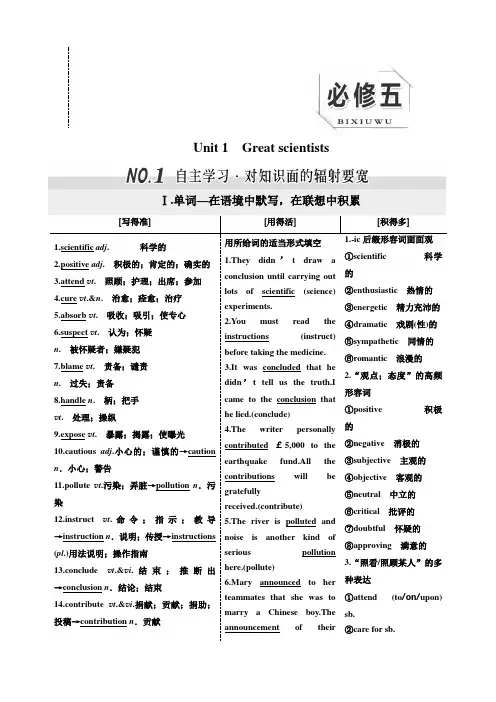
Unit 1Great scientistsⅠ.单词—在语境中默写,在联想中积累[写得准][用得活][积得多]1.scientific adj. 科学的2.positive adj. 积极的;肯定的;确实的3.attend v t. 照顾;护理;出席;参加4.cure v t.&n. 治愈;痊愈;治疗5.absorb v t. 吸收;吸引;使专心6.suspect v t. 认为;怀疑n. 被怀疑者;嫌疑犯7.blame v t. 责备;谴责n. 过失;责备8.handle n. 柄;把手v t. 处理;操纵9.expose v t. 暴露;揭露;使曝光10.cautious adj.小心的;谨慎的→caution n.小心;警告11.pollute v t.污染;弄脏→pollution n.污染12.instruct v t.命令;指示;教导→instruction n.说明;传授→instructions (pl.)用法说明;操作指南13.conclude v t.&v i.结束;推断出→conclusion n.结论;结束14.contribute v t.&v i.捐献;贡献;捐助;投稿→contribution n.贡献用所给词的适当形式填空1.They didn’t draw aconclusion until carrying outlots of scientific (science)experiments.2.You must read theinstructions (instruct)before taking the medicine.3.It was concluded that hedidn’t tell us the truth.Icame to the conclusion thathe lied.(conclude)4.The writer personallycontributed £5,000 to theearthquake fund.All thecontributions will begratefullyreceived.(contribute)5.The river is polluted andnoise is another kind ofserious pollutionhere.(pollute)6.Mary announced to herteammates that she was tomarry a Chinese boy.Theannouncement of their1.-ic后缀形容词面面观①scientific科学的②enthusiastic 热情的③energetic 精力充沛的④dramatic 戏剧(性)的⑤sympathetic 同情的⑥romantic 浪漫的2.“观点;态度”的高频形容词①positive积极的②negative 消极的③subjective 主观的④objective 客观的⑤neutral 中立的⑥critical 批评的⑦doubtful 怀疑的⑧approving 满意的3.“照看/照顾某人”的多种表达①attend (to/on/upon)sb.②care for sb.Ⅱ.短语—在应用中记牢,在归纳中记多lead_to heart disease and cause high blood pressure.[背原句][记句式][会仿用]1.Neither its cause nor its cure was understood. 人们既不知道它的病源,也不了解它的治疗方法。
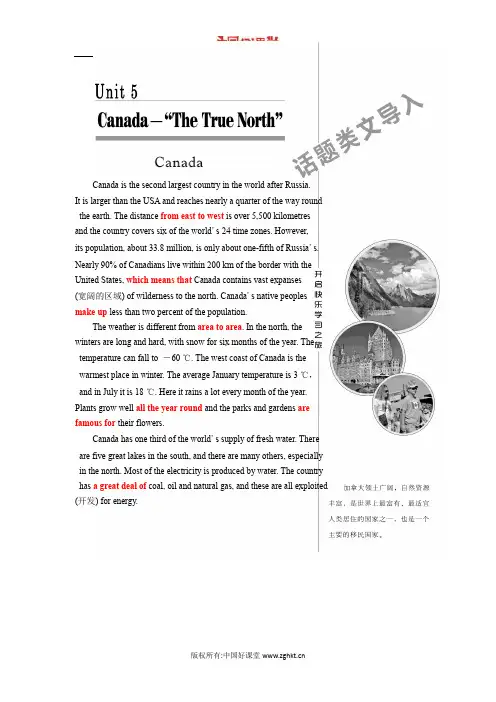
Canada is the second largest country in the world after Russia.It is larger than the USA and reaches nearly a quarter of the way round the earth. The distance from east to west is over 5,500 kilometres and the country covers six of the world's 24 time zones. However,its population, about 33.8 million, is only about one-fifth of Russia's. Nearly 90% of Canadians live within 200 km of the border with the United States, which means that Canada contains vast expanses(宽阔的区域) of wilderness to the north. Canada's native peoples make up less than two percent of the population.The weather is different from area to area. In the north, the winters are long and hard, with snow for six months of the year. The temperature can fall to -60 ℃. The west coast of Canada is the warmest place in winter. The average January temperature is 3 ℃,and in July it is 18 ℃. Here it rains a lot every month of the year. Plants grow well all the year round and the parks and gardens are famous for their flowers.Canada has one third of the world's supply of fresh water. There are five great lakes in the south, and there are many others, especially in the north. Most of the electricity is produced by water. The country has a great deal of coal, oil and natural gas, and these are all exploited (开发) for energy.Section_ⅠWarming Up & Reading — Pre-reading[原文呈现][读文清障]A TRIP ON “THE TRUENORTH①”Li Daiyu and her cousin Liu Qian were on a trip to②Canada to visit their cousins in Montreal on the Atlantic coast③. Rather than④take the aeroplane all the way, they decided to fly to Vancouver and then take the train from west to east across Canada. The thought ⑤that they could cross the whole continent⑥was exciting.Their friend, Danny Lin, was waiting at the airport. He was going to take them and their baggage⑦to catch “The True North”,the cross-Canada train. On the way to the station, he chatted⑧about their trip. “You're going to see some great scenery⑨. ⑩Going eastward⑪,you'll pass mountains and thousands of lakes and forests, as well as wide rivers and large cities. Some people have the idea that you can cross Canada in less than five days, but they forget the fact that Canada is 5,500 kilometres from coast to coast. Here in Vancouver, you're in Canada's warmest part. People say it is Canada's most beautiful ①THE TRUE NORTH有两个含义:一是它的本义“真正的北方”,即加拿大是地球上最北端的国家之一;二是指横贯加拿大东西部的一列火车的名字。
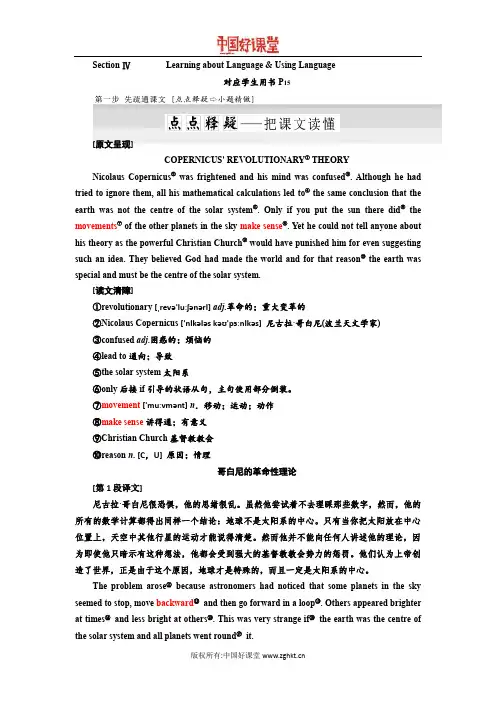
SectionⅣLearningaboutLanguage&UsingLanguage对应学生用书P15[原文呈现]COPERNICUS' REVOLUTIONARY① THEORYNicolaus Copernicus②was frightened and his mind was confused③. Although he had tried to ignore them, all his mathematical calculations led to④ the same conclusion that the earth was not the centre of the solar system⑤. Only if you put the sun there did⑥the movements⑦ of the other planets in the sky make sense⑧. Yet he could not tell anyone about his theory as the powerful Christian Church⑨ would have punished him for even suggesting such an idea. They believed God had made the world and for that reason⑩the earth was special and must be the centre of the solar system.[读文清障]①revolutionary [ˌrevə'luːʃənərI]adj.革命的;重大变革的②Nicolaus Copernicus ['nIkələs kəʊ'pɜːnIkəs] 尼古拉·哥白尼(波兰天文学家)③confused adj.困惑的;烦恼的④lead to通向;导致⑤the solar system太阳系⑥only后接if引导的状语从句,主句使用部分倒装。
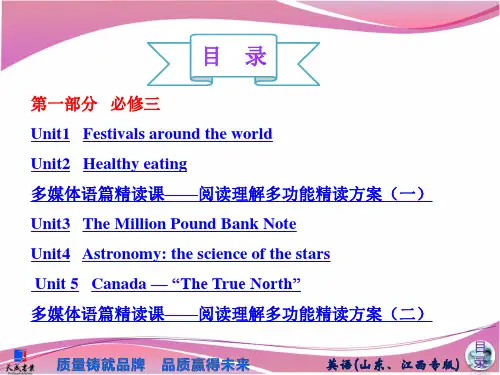
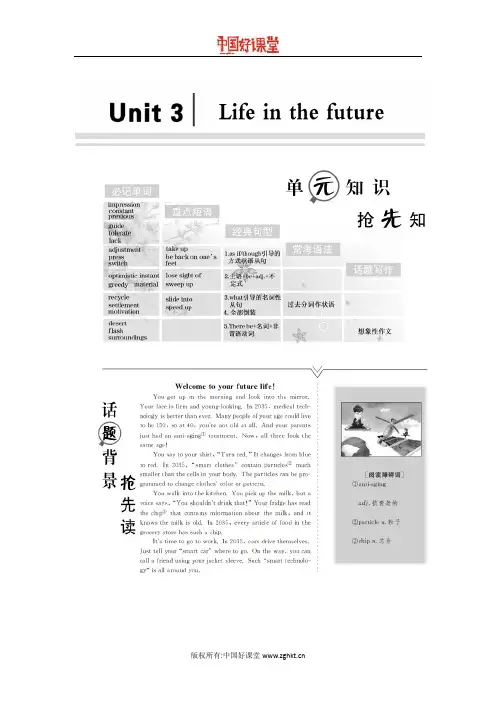
Ⅰ.Match the word with its meaning.1.aspect A.v t.系牢;扎牢2.impression B.n.方面;层面3.constant C.adj.在前的;早先的4.previous D.n.印象;感想;印记5.uncertain E.adj.时常发生的;连续不断的6.guide F.v t.&v i.(使)闪光;(使)闪现7.surroundings G.adj.不确切的;无把握的8.tolerate H.adj.乐观(主义)的9.lack I.v i.&v i按;压;逼迫n.按;压;印刷;新闻10.adjustment J.n.开关;转换v t.转换11.press K.n.调整;调节12.fasten L.v t.容忍;忍受13.flash M.v i.&v t.缺乏;没有n.缺乏;短缺的东西14.switch N.n.指导;向导;导游v t.指引;指导15.optimistic O.n.周围的事物;环境答案:1~5BDECG6~10NOLMK11~15IAFJHⅡ.Write down the meaning of phrases in each sentence.1.You should take up my suggestion and start saving money.接受2.Sue' s back on her feet again after her operation.恢复3.We must not lose sight of our achievements.看不见4.The cleaner had to sweep up hundreds of broken bottles.打扫5.She is able to slide into a room without anyone noticing.溜进Ⅰ.Lead-inAccording to the following pictures, can you predict what the future life will be like?Theanswermaybevariousaccordingtothedifferentstudents.Ⅱ.Fast reading1.Match the following paragraphs with their main ideas.Para 1A.We were transported into the future by a comfortable time capsule.Para 2B.My impressions of the life in the future and my first try to master a hovering carriage.Para 3C.I arrived at Wang Ping's home and everything in his house made me surprised.Para 4D.I won a travel to the year AD 3008.答案:DABC2.What's the main idea of the passage?A.How Li Qiang was transported to the future.B.How Li Qiang got to the future and his first impression of it.C.What the life was like in the future.D.The introduction of the “Future Tours” company.答案:BⅢ.Careful readingRead the text carefully and choose the best answers.1.From this passage, wh at is “time lag”?A.It is a kind of feeling that means you are unfit for the present conditions.B.It is a kind of feeling that means you are confused by the present situation.C.It is a kind of feeling that means you are confused by the changes of the time.D.It is a kind of feeling that means you are unfit for the changes of different time areas, especially you are always behind the present time.2.When and where did this story happen?A.It happened in outer space in the future.B.It happened on the earth in the future.C.It happened in outer space at the present time.D.It happened on the earth at the present time.3.How did the system work?A.Oxygen was provided by a group of machines.B.Oxygen was provided by some chemicals.C.Oxygen was provided by some green leaves.D.Oxygen was made from some chemical materials.4.Where did Li Qiang lose sight of Wang Ping?A.In a hotel capsule.B.In a room.C.In a large market.D.In a hovering carriage.5.We can infer from the passage that .A.the air quality would not be so good in the public areas in the futureB.everyone would have to put on a mask when they went outside in the futureC.the writer had been transported into another cityD.the writer felt uncomfortable for a long time after finishing the journey答案:1~5DBCCAⅣ.Study readingAnalyze the following difficult sentences in the text.1.This is similar to the “jet lag” you get from flying, but it seems you keep getting flashbacks from your previous time period.[句式分析][尝试翻译]这就与你乘坐飞机会产生时差反应相似,所不同的是,在你的脑子里似乎会不断闪现以前的时光。
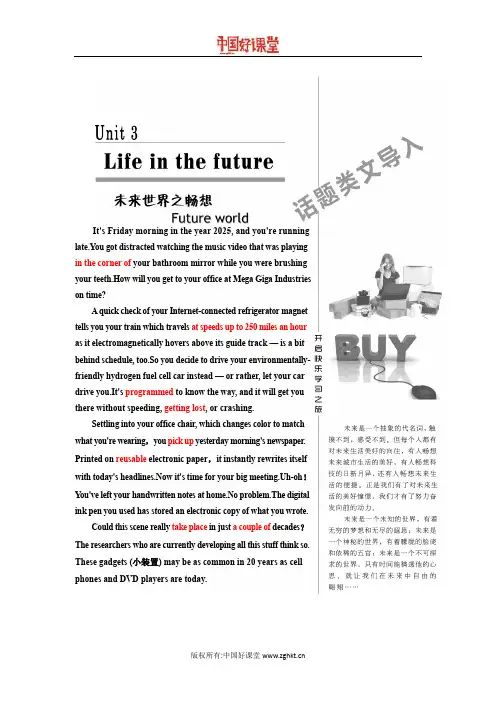
It's Friday morning in the year 2025, and you're running late.Y ou got distracted watching the music video that was playing in the corner of your bathroom mirror while you were brushing your teeth.How will you get to your office at Mega Giga Industries on time?A quick check of your Internet-connected refrigerator magnet tells you your train which travels at speeds up to 250 miles an hour as it electromagnetically hovers above its guide track — is a bit behind schedule, too.So you decide to drive your environmentally-friendly hydrogen fuel cell car instead — or rather, let your car drive you.It's programmed to know the way, and it will get you there without speeding, getting lost, or crashing.Settling into your office chair, which changes color to match what you're wearing,you pick up yesterday morning's newspaper. Printed on reusable electronic paper,it instantly rewrites itself with today's headlines.Now it's time for your big meeting.Uh-oh!Y ou've left your handwritten notes at home.No problem.The digital ink pen you used has stored an electronic copy of what you wrote.Could this scene really take place in just a couple of decades?The researchers who are currently developing all this stuff think so. These gadgets (小装置) may be as common in 20 years as cell phones and DVD players are today.Section ⅠWarming Up & Reading — Pre-reading[原文呈现]FIRST IMPRESSIONS①Spacemail:liqiang299A@15/11/3008(Earthtime) Dear Mum and Dad,I still cannot believe that I am taking up②this prize that I won last year.I have to remind myself constantly③ that I am really in AD 3008. Worried about the journey④,I was unsettled⑤ for the first few days. As a result, I suffered from⑥“time lag”. This is similar to⑦the “jet lag⑧”you get from flying⑨,but it seems⑩ you keep getting flashbacks⑪from your previous⑫time period.So I was very nervous and uncertain⑬at first.However, my friend and guide⑭,Wang Ping, was very understanding⑮and gave me some green tablets⑯which helped a lot.Well-known for their expertise⑰,his parents' company, called “Future Tours”⑱,transported me safely into the future in a time capsule⑲.[读文清障]①impression [Im'preʃn]n.印象;感想;印记②take up拿起;接受;开始;继续③constantly['kɒnstəntlI]ad v.不断地④形容词短语worried about the journey作原因状语。
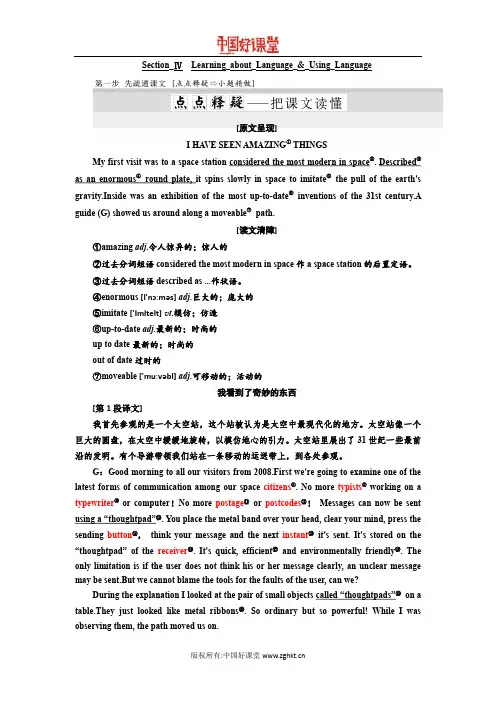
Section_ⅣLearning_about_Language_&_Using_Language[原文呈现]I HA VE SEEN AMAZING① THINGSMy first visit was to a space station considered the most modern in space②. Described③as an enormous④round plate, it spins slowly in space to imitate⑤the pull of the earth's gravity.Inside was an exhibition of the most up-to-date⑥inventions of the 31st century.A guide (G) showed us around along a moveable⑦path.[读文清障]①amazing adj.令人惊异的;惊人的②过去分词短语considered the most modern in space作a space station的后臵定语。
③过去分词短语described as ...作状语。
④enormous [I'nɔːməs]adj.巨大的;庞大的⑤imitate ['ImIteIt]v t.模仿;仿造⑥up-to-date adj.最新的;时尚的up to date最新的;时尚的out of date过时的⑦moveable ['muːvəbl]adj.可移动的;活动的我看到了奇妙的东西[第1段译文]我首先参观的是一个太空站,这个站被认为是太空中最现代化的地方。
太空站像一个巨大的圆盘,在太空中缓缓地旋转,以模仿地心的引力。
太空站里展出了31世纪一些最前沿的发明。
有个导游带领我们站在一条移动的运送带上,到各处参观。
G:Good morning to all our visitors from 2008.First we're going to examine one of the latest forms of communication among our space citizens⑧. No more typists⑨ working on a typewriter⑩or computer!No more postage⑪or postcodes⑫!Messages can now be sent using a “thoughtpad”⑬. You place the metal band over your head, clear your mind, press the sending button⑭,think your message and the next instant⑮it's sent. It's stored on the “thoughtpad” of the receiver⑯. It's quick, efficient⑰and environmentally friendly⑱. The only limitation is if the user does not think his or her message clearly, an unclear message may be sent.But we cannot blame the tools for the faults of the user, can we?During the explanation I looked at the pair of small objects called “thoughtpads”⑲on a table.They just looked like metal ribbons⑳. So ordinary but so powerful! While I was observing them, the path moved us on.⑧citizen['sItIzn]n.公民;居民;市民⑨typist['taIpIst]n.打字员⑩typewriter['taIpˌraItə]n.打字机⑪postage['pəʊstIdʒ]n.邮资⑫postcode['pəʊstkəʊd]n.邮政编码⑬现在分词短语using a “thoughtpad”作方式状语。
英语必修5人教版新课标Unit 1第3课时教案Period 3 Listening and speaking (Using Language) Teaching Goals: 1. To use the Ianguage points and grammar of this unit.2.To develop SsTistening and speaking abilities.Teaching Procedures:Step L Leading-inPurpose: To activate Ss and arouse them to talk about scientific subjects.Show the pictures about the scientists and ask Ss whether they know them・ And make sure they know some famous scientists in China.Step 2. Warming UpPurpose: To lead Ss to the topic of this unit.1.Group workThe above pictures are all Chinese famous scientists・ Let Ss talk about the stories of them・ And they can also talk about other scientists in China. Get some Ss to present their stories to the rest of class. 2.ConclusionAll of them have made con tributi ons to the developme nt of Chin ese scie nee and tech no logy ・ But do you know who the father of the Chinese space program is? (Qian Xuesen)Step 3・ Pre-listeningPurpose: To help Ss learn about the context of the Listening part.1.Pair workAsk Ss to discuss the pictures with their partners.2.DiscussionDiscuss the following three questions and present your opinions to your classmates.(1)How can you describe the space?(2)If we human beings go into the space, what are needed?(3)Suppose you are an astronaut, what kind of qualities are necessary?Step 4. While-listeningPurpose: 1. To get the main information in the Listening part・2.To develop SsTistening ability.3.To learn something from Qian Xuesen.1.Listen to the dialogue, focusing on the subjects mentioned in the passage・2.Listen to the tape and answer the questions.Ql. What did Qian Xuesen study first?Q2. What experienee did he get in America that was very useful for China?Q3. What was Qian XueserVs achievement when he returned to China from America?Suggested answers:Al. Qian Xuesen first studied to be an engineer.A2・ In America he began to work on space rockets so that he was able to develop a space programme when he came back to China.A3. When Qian Xuesen returned to China he set up a Space Institute to begin training people in how to design and build rockets.3.Listen to the tape again and make sure the answers are right.Step 5. SpeakingPurpose: 1. To develop Ss z speaking ability.2. To learn about the words for character description.1.Pre-speakingPurpose: To arouse Ss〃interest and get them to focus on the topic of the Speaking part.Show the pictures again.Pair workLet Ss discuss in pairs and present how they achieved their success in their future scientific job・ What kind of words can be used?For your reference:tale nt, in tellige nee, hard work, persiste nee, con fide nee, curiosity, en thusiasm, luck•••2.While-speakingPurpose: To get Ss to talk about their favorite scientific jobs・(1) Work in groups of four and discuss what scientific job each of Ss would like to choose in the future・The following questions and expressions can be helpful.Questions:What job do you want to do?What personality will be needed?What education will you need?What personality will be needed?How lone will the training take?What work experienee would be useful?How will you prepare for this career?Expressions:(2) Act out the dialogue and show to the class.When describe someone〃s character; the following words can be used・patie nt, creative, hard-working, co-operative, con fide nt, brave, positive, pleasa nt, polite, determined, energetic, strict with •••Sample dialogue:A: What do you want to do when you grow up?B: I want to build robots. I will have to do a physics and mathematics degree in china. After that I hope to go abroad to Reading University in England where you can study all about robots. There is a special cybernetics department there.A: Why personality will be needed for that job?B: They have a lot of uses: for example, in making cars on a popular line or doing other repetitive jobs.A: What personality will be needed for that job?B: I think I need to be patient for my ideas will take a long time to develop. I also need to be creative eno ugh to have good ideas.A: What experienee will be most useful to you?B: I think tech no logy and engin eeri ng projects. I hope to work in a factory in my holidays.A: What kind of pers on makes a good inven tor?B: I think some one who is happy to persevere at somethi ng and learns from his mistakes.A: Thank you. I think designing robots sounds fun.3.Post-speakingAsk some Ss to give a speech to their classmates about their scientific jobs in the futureStep 6. ExtensionPurpose: To make a conclusion from the Speaking part.Discuss the questions below with your partners.We know that a scientific job is challenging and difficult, but there are still many persons doing very well at their positions. What can you learn from them?Share your views with your classmates・Step 7. Homework:L Write a short composition to introduce Qian Xuesen・2. Get on the line and find out more scientists and their stories.。
Unit 3Life in the futureⅠ.单词—在语境中默写,在联想中积累1.typewriter n.打字机2.tablet n. 药片3.previous adj. 在前的;早先的4.uncertain adj. 不确切的;无把握的ck v i.&v t. 缺乏;没有n. 缺乏;短缺的东西6.exhausted adj. 筋疲力尽的;疲惫不堪的7.switch n. 开关;转换v t. 转换8.impression n.印象;感想;印记→impress v.使留下深刻印象→impressive adj.给人深刻印象的9.constant adj.时常发生的;连续不断的→constantly ad v.不断地10.surroundings n.周围的事物;环境→surrounding adj.周围的11.adjustment n.调整;调节→adjust v t.调整;调节12.press v i.&v t.按;压;逼迫n.按;压;印刷;新闻→pressure n.压力13.optimistic adj.乐观(主义)的→optimism n.乐观主义14.instant n.瞬间;片刻adj.立即的;立刻的→instantly ad v.立即;立刻15.settlement n.定居;解决→settle v.定居;解决→settler n.定居者bination n.结合;组合→combine v i.联合;结合1.Having no motivation(motivate) to study may be themost dangerous thing for astudent.2.They have decided to make afew adjustments (adjust) totheir travelling plan.3.They were both uncertain(certain) about what to do andwent to their uncle for help.4.As I walked through thetown, I was constantly(constant) reminded of mychildhood.5.His discovery was hardlycommented by thepress,_which gave him lesspressure.(press)6.When I first met him I gotthe impression that he was ashy man. That is what heimpressed me most.(impress)7.We are in instant need ofhelp. Please tell us instantlythey arrive.(instant)8.I always dream of having ahouse surrounded by trees andflowers. If we can live in suchbeautiful surroundings,_wemust have a happy feelingevery day. The surrounding1.-er后缀指物的名词小结①typewriter打字机②receiver 听筒;话筒③counter 柜台④drawer 抽屉⑤cooker 炊具⑥speaker 扬声器2.“药”之种种①tablet n.药片②pill n. 药片;药丸③drug n. 药④capsule n. 胶囊⑤traditional Chinesemedicine中药⑥western medicine 西药3.press家族①press v.&n. 按;压②pressure n. 压力③impress v. 留下印象④impression n. 印象⑤express v. 表达⑥expression n. 表达;表情4.“容忍”的各种表达①tolerate v t.忍受②bear v t. 忍受17.tolerate v t.容忍;忍受→tolerance n.容忍;宽容18.motivation n.动机→motivate v.成为……的动机things always have an effect onour mood.(surround)③stand v t. 忍受④put up with 忍受;容忍Ⅱ.短语—在应用中记牢,在归纳中记多1.take_up拿起;接受;开始;继续;占用2.suffer_from 患有(疾病等);为……受苦3.as_a_result 结果;因此4.be_greedy_for_... 对……贪婪5.(a)_lack_of ……方面的短缺6.be_back_on_one’s_feet (困境后)恢复;完全复原7.lose_sight_of_... 看不见……8.in_all_directions 向四面八方9.sweep_up 打扫;横扫10.slide_into (快捷而悄声地)移动;溜进……11.remind_sb._of_... 使某人想起……12.speed_up 加速1.I watched the plane go hig herand higher until I lost_sight_ofit.2.With the pace of modern lifespeeding_up,_instant food ismore and more popular.3.In the meantime, the lorrydriver had to sweep_uphundreds of broken bottles.4.Tom thought carefully forseveral days and decided totake_up the job.5.Nobody noticed when heentered the classroom; heslid_into it from the back door.6.She showed a_lack_ofresponsibility, so she lost thegood opportunity.1.“v.+from”短语荟萃①suffer from遭受②adapt from 从……改编③benefit from 从……中获益④date from 始于……⑤result from 因……而起⑥escape from 从……逃脱⑦die from 死于⑧hear from 收到某人的来信2.表示“结果;因此”的词汇大全①as a result②as a consequence③consequently④therefore/thusⅢ.句式—在解读中学懂,在仿写中学通1.Hit by a lack of fresh air, my head ached.由于缺乏新鲜的空气,我头痛。
2016新课标创新⼈教英语必修五Unit3Section3[语法初识][语法剖析]过去分词作状语,可以表⽰时间、让步、条件、原因、⽅式和结果,相当于⼀个状语从句。
其逻辑主语为主句的主语,且与主句主语之间构成逻辑上的动宾关系。
1.作时间状语。
相当于时间状语从句。
可在过去分词前加上连词“when, while, until”等,使其时间意义更明确。
(2012·安徽⾼考)When asked for his views about his teaching job, Philip said he found it very interesting and rewarding.当被问到对教学⼯作的观点时,菲利普说他觉得既有趣⼜有意义。
2.作原因状语。
相当于原因状语从句或并列结构。
(2015·天津⾼考)Absorbed in painting, John didn't notice evening approaching.专⼼于画画,约翰没有注意到时间是晚上了。
3.作条件状语。
相当于条件状语从句。
可加连词if, unless等转换成条件状语从句。
(2012·北京⾼考)Used with care, one tin will last for six weeks.如果⽤得仔细的话,⼀罐可以够⽤六周。
4.作让步状语。
相当于让步状语从句。
有时可加although, though, even if, even though, whether ... or等连词转换成让步状语从句。
Defeated by his opponent, he never gave up any hope.=Although he was defeated by his opponent, he never gave up any hope.尽管被对⼿击败,但是他从没放弃希望。
5.作⽅式、伴随状语。
相当于and连接的并列结构。
Section ⅢGrammar—过去分词作定语和表语对应学生用书P12语法图解探究发现①But he became inspired when he thought about helping ordinary people exposed to cholera.②So many thousands of terrified people died every time there was an outbreak.③He became interested in two theories that possibly explained how cholera killed people.④From the stomach the disease quickly attacked the body and soon the affected person died.⑤He was determined to find out why.⑥He found that it came from the river polluted by the dirty water from London.⑦He immediately told the astonished people in Broad Street to remove the handle from the pump so that it could not be used.⑧With this extra evidence John Snow was able to announce with certainty that polluted water carried the germs.[我的发现](1)例句①②④⑥⑦⑧中的过去分词(短语)作定语。
(2)例句②④⑦⑧中为单个的过去分词作定语,常常放于被修饰名词的前面;例句①⑥中过去分词短语作定语,常常放于被修饰名词的后面。
(3)例句③⑤中的过去分词在句中作表语。
一、过去分词作定语1.过去分词作定语时的位置(1)前置定语一般情况下,单个过去分词作前置定语,即放在所修饰词之前。
The polluted water was to blame for the spread of cholera.被污染的水造成了霍乱的传播。
The recovered animals will be released soon.痊愈的动物会很快被释放。
[名师点津]①有些过去分词表示特定含义时,单独作定语也放在所修饰的名词之后,如left(剩余的),given(所给的),concerned(有关的)等。
There are few tigers left. It is time for the departments concerne d to take measures to protect them from dying out.剩余的老虎不多了,是相关当局采取措施保护它们免遭灭绝的时候了。
②如果被修饰的词是由every/some/any/no与thing/body/one所构成的复合代词或指示代词those等,单个分词放在被修饰词的后面。
Is there anything unsolved?还有什么没解决的吗?(2)后置定语过去分词短语作定语时往往作后置定语,即放在所修饰词之后,它的作用相当于一个定语从句。
Last Tuesday in a mountainous area, there were a total of 173 sheep killed almostimmediately (=which were killed almost immediately) when lightning struck.上周二在一个山区,当雷击发生时有173只羊即刻被雷电击死。
[即时演练1](1)用所给词的适当形式填空①(2015·新课标全国卷Ⅱ语法填空)The adobe dwellings (土坯房) built (build) by the Pueblo Indians of the American Southwest are admired by even the most modern of architects and engineers.②The witnesses questioned (question) by the police just now gave very different descriptions of the fight.(2)同义句转换①He is a teacher loved by his students.→He is a teacher who_is_loved_by_his_students.②The girl, who was brought up by her uncle, has begun to work now.→The girl, brought_up_by_her_uncle,_has begun to work now.2.过去分词作定语时的意义(1)及物动词的过去分词作定语,在语态上表示被动;在时间上,常表示动作已经发生或完成,有时也不表示时间性。
Trucks and buses were driven on gas carried in large bags on the roof. (表被动)卡车与公共汽车皆烧煤气,煤气装在车顶上的大袋中。
The plan put forward at the meeting will be carried out soon. (表被动和完成)会上提出的计划将很快被执行。
(2)不及物动词的过去分词作定语,它不表示被动意义,只强调动作完成。
Our retired soccer coach went to watch us play a game last week.上周我们已退休的足球教练去看我们打了一场比赛。
The risen sun is shining brightly in the morning.早上已升起的太阳正明亮地闪耀。
[即时演练2]选择填空过去分词作定语有三种情况:A.只表被动B.只表完成C.既表被动又表完成请判断下列句子中加黑部分属于哪种情况①America is a developed countrying.__B__②I found it hard to understand the English spoken by the native villagers.__A__③Is there anything planned for the weekend?__C__3.过去分词与现在分词作定语的区别As we all know, China is a developing countrying.众所周知,中国是一个发展中国家。
The visitor came from a developed countrying.这位游客来自于一个发达国家。
[即时演练3]用分词作定语补全句子①Even though it is still in summer, there_are_many_fallen_leaves on the ground. 即使仍是夏天,地上有很多的落叶。
②Nowadays there are a lot of man-made satellites flying_in_space.如今在太空中有许许多多人造卫星在飞行。
4.过去分词(done)、现在分词的被动语态(being done)与动词不定式的被动语态(to be done)作定语的区别去年建造的楼是我们的教学楼。
The building being built now is our classroom building.现在正在建造的楼是我们的教学楼。
The building to be built next month is our classroom building.下个月将要建造的楼是我们的教学楼。
[即时演练4]用所给词的适当形式填空①The cars being_sold (sell) at the market now are made in Guangzhou.②Tsinghua University, founded (found) in 1911, is home to a great number of outstanding figures.③(2014·北京高考改编)There are still many problems to_be_solved (solve) before we are ready for a long stay on the Moon.二、过去分词作表语1.过去分词作表语的用法过去分词可放在连系动词be, get, feel, remain, seem, look, become等之后作表语,表示主语所处的状态。
He looked worried after reading the letter.看完信后,他显得很忧虑。
When we heard of it, we were deeply moved.当我们听到这件事时,被深深地感动了。
[即时演练5](1)用所给词的适当形式填空①(2014·广东高考语法填空)We got a little sunburned/sunburnt_ (sunburn), but the day had been so relaxing that we didn't mind.②(2014·安徽高考改编)While waiting for the opportunity to get promoted (promote), Henry did his best to perform his duty.(2)补全句子①Why do you always look_tired?你为什么总是看上去很疲劳?②I was_disappointed at the film I saw last night. I had expected it to be better.我对昨晚看的电影很失望。
我原以为它能好些。
2.过去分词作表语时与被动语态的区别过去分词作表语时,强调主语所处的状态,而动词的被动语态表示主语是动作的承受者,强调动作。
The cup is broken.杯子破了。
(系表结构)The cup was broken by Tom.杯子是汤姆打破的。